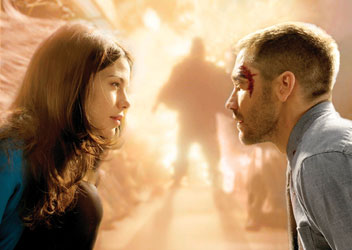Deja View
A hash of ideas from various films, the sci-fi thriller Source Code more-than-ably stands on its own merits
Source Code is a cross between 24 and Groundhog Day and Moon and The Matrix and The Adjustment Bureau and Avatar and Quantum Leap and Inception. In other words, Source Code will remind you of a number of iconic science-fiction stories. But… it solidly deserves to be counted among their ranks as a worthy companion.

I wish I could quit you: Gyllenhaal
(Photo by Jonathan Wenk)
Source Code is the second feature film for director Duncan Jones (David Bowie’s son), following the much lower-budget independent film, Moon. Moon‘s success came largely from Jones’s ability to beautifully construct a lunar existence for a sole astronaut and the bizarre reality of this solitary existence. Moon was slow and methodical, sometimes to the point of stalling. Source Code is flashier in every sense, and overcorrects on this last point to the extent that it starts with an explosion and repeats it multiple times over the course of 90 minutes.
Capt. Colter Stevens (Jake Gyllenhaal) wakes up to discover he’s become a stranger on a train. His seatmate, Christina (Michelle Monaghan), thinks he’s someone else and picks up a conversation already in progress; a flurry of events occur in rapid succession, which are laid out like clues before him, some having lifesaving implications and others just red herrings. Before Stevens can piece together the puzzle, an explosion rips apart the train and Colter returns to Beleaguered Castle, a military training site. To clarify, his consciousness returns, since all along he was just inhabiting the memory of a teacher killed in a terrorist attack.
Colter is just as confused as the audience at this point, so his handler, a cool yet stern military officer on the other end of a video feed, launches into exposition to explain that he is on a mission to identify a terrorist who has struck once and is now planning to hit Chicago with a dirty bomb. According to Capt. Goodwin (Vera Farmiga), he must relive the last eight minutes of the victim’s life to identify the terrorist. Since the first attack already happened, he can’t change its outcome, which really sucks when Stevens falls for the girl.




Starring
Jake Gyllenhaal,
Vera Farmiga
Rated PG-13
93 Minutes
Opens Friday,
April 1
Area Theaters
What’s really going on with Colter is the crux of first-time screenwriter Ben Ripley’s script. It’s evident that neither Colter nor the audience is expected to accept the military’s word at face value, so the film starts running on two different tracks. On one, the hunt for the bomber takes precedent as Colter relives – and slightly alters each time – the events on the train leading up to the explosion. In the parallel existence, Colter hunts for the truth behind his mission. Each time Colter returns to the train, he tries something new. Between each visit Goodwin doles out a little more information about the military project. Tying the two stories together is the love-at-first-sight Colter develops for Christina and how it motivates him.
Given how poorly Gyllenhaal’s last attempt at being an action star turned out (see Prince of Persia), it’s quite refreshing to watch him handle Source Code so adroitly. Running around the train in hot pursuit of the terrorist is the most predictable part of the film and the least interesting. When the action returns to the military base, Gyllenhaal gives a much more compelling performance. Colter is trapped in isolation and only able to communicate via monitors, allowing Gyllenhaal to focus on the inner turmoil and motivation that drives the character. A few moments come off as little more than a rant and screaming, but he manages an emotional resonance that carries through the story and builds to a strong finale.
Farmiga has a more difficult part, rarely leaving her desk and forced to stare into a camera. As the love interest, Christina is an utterly forgettable character and Monaghan plays the part safe. There’s little to explain Colter’s instant attraction to her other than the fact that she’s ”nice.”
Like any good science-fiction story, the validity of the concept and the possible contradictions and paradoxes provide numerous points of debate for the most ardent fans of the genre. While there are shades of Jones’s Moon throughout Source Code, there’s an undeniable tinge of commercialism and mainstream filmmaking in Source Code. Yet even with the bigger explosions and starpower, it’s evident that Jones is still trying to do it his way. Some of the most effective moments are the small ones, while the weakest scenes are obviously meant to contain a ”wow” factor that fizzles. Nevertheless, Source Code is a welcome addition to the science-fiction world. And while it takes Stevens almost 10 times to succeed, it’s clear that Jones is getting it right far more quickly.
Support Metro Weekly’s Journalism
These are challenging times for news organizations. And yet it’s crucial we stay active and provide vital resources and information to both our local readers and the world. So won’t you please take a moment and consider supporting Metro Weekly with a membership? For as little as $5 a month, you can help ensure Metro Weekly magazine and MetroWeekly.com remain free, viable resources as we provide the best, most diverse, culturally-resonant LGBTQ coverage in both the D.C. region and around the world. Memberships come with exclusive perks and discounts, your own personal digital delivery of each week’s magazine (and an archive), access to our Member's Lounge when it launches this fall, and exclusive members-only items like Metro Weekly Membership Mugs and Tote Bags! Check out all our membership levels here and please join us today!




















